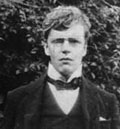What’s
Wrong with the
World:
.
On the Madness
of Modern
Ideals
.
by G.K.
Chesterton
The madness of modern
sophists
Numbers of readers will expect me, when I
propound an ideal, to propound a new ideal.
Now I have no notion at all of propounding a
new ideal. There is no new ideal imaginable by
the madness of modern sophists, which will be
anything like so startling as fulfilling any
one of the old ones.
| “Men have not got
tired of Christianity; they have
never found enough Christianity to
get tired of.” |
Christ knew that it would be a more stunning
thunderbolt to fulfill the law than to destroy
it. It is true of both the cases I have
quoted, and of every case. The pagans had
always adored purity: Athena, Artemis, Vesta.
It was when the virgin martyrs began defiantly
to practice purity that they rent them with
wild beasts, and rolled them on red-hot coals.
The world had always loved the notion of the
poor man uppermost; it can be proved by every
legend from Cinderella to Whittington, by
every poem from the Magnificat to the
Marseillaise. The kings went mad against
France not because she idealized this ideal,
but because she realized it. Joseph of Austria
and Catherine of Russia quite agreed that the
people should rule; what horrified them was
that the people did. The French Revolution,
therefore, is the type of all true
revolutions, because its ideal is as old as
the Old Adam, but its fulfillment almost as
fresh, as miraculous, and as new as the New
Jerusalem.
But in the modern world we are primarily
confronted with the extraordinary spectacle of
people turning to new ideals because they have
not tried the old. Men have not got tired of
Christianity; they have never found enough
Christianity to get tired of. Men have never
wearied of political justice; they have
wearied of waiting for it.
The principle of
domesticity
Now, for the purpose of this book, I propose
to take only one of these old ideals, but one
that is perhaps the oldest. I take the
principle of domesticity: the ideal house, the
happy family, the holy family of history. For
the moment it is only necessary to remark that
it is like the church and like the republic,
now chiefly assailed by those who have never
known it, or by those who have failed to
fulfill it. Numberless modern women have
rebelled against domesticity in theory because
they have never known it in practice. Hosts of
the poor are driven to the workhouse without
ever having known the house. Generally
speaking, the cultured class is shrieking to
be let out of the decent home, just as the
working class is shouting to be let into
it.
Hacking a sonnet out of
a rock
Now if we take this house or home as a test,
we may very generally lay the simple spiritual
foundations of the idea. God is that which can
make something out of nothing. Man (it may
truly be said) is that which can make
something out of anything. In other words,
while the joy of God be unlimited creation,
the special joy of man is limited creation,
the combination of creation with limits.
Man's pleasure, therefore, is to possess
conditions, but also to be partly possessed by
them; to be half-controlled by the flute he
plays or by the field he digs. The excitement
is to get the utmost out of given conditions;
the conditions will stretch, but not
indefinitely. A man can write an immortal
sonnet on an old envelope, or hack a hero out
of a lump of rock. But hacking a sonnet out of
a rock would be a laborious business, and
making a hero out of an envelope is almost out
of the sphere of practical politics.
The idea of artistic
expression
This fruitful strife with limitations, when it
concerns some airy entertainment of an
educated class, goes by the name of Art. But
the mass of men have neither time nor aptitude
for the invention of invisible or abstract
beauty. For the mass of men the idea of
artistic creation can only be expressed by an
idea unpopular in present discussions –
the idea of property.
The average man cannot cut clay into the
shape of a man; but he can cut earth into the
shape of a garden; and though he arranges it
with red geraniums and blue potatoes in
alternate straight lines, he is still an
artist; because he has chosen. The average man
cannot paint the sunset whose colors he
admires; but he can paint his own house with
what color he chooses, and though he paints it
pea green with pink spots, he is still an
artist; because that is his choice.
Property is merely the art of the democracy.
It means that every man should have something
that he can shape in his own image, as he is
shaped in the image of heaven. But because he
is not God, but only a graven image of God,
his self-expression must deal with limits;
properly with limits that are strict and even
small.
I am well aware that the word “property” has
been defied in our time by the corruption of
the great capitalists. One would think, to
hear people talk, that the Rothchilds and the
Rockefellers were on the side of property. But
obviously they are the enemies of property;
because they are enemies of their own
limitations. They do not want their own land;
but other people's. When they remove their
neighbor's landmark, they also remove their
own.
A man who loves a little triangular
field ought to love it because it is
triangular; anyone who destroys the shape, by
giving him more land, is a thief who has
stolen a triangle. A man with the true poetry
of possession wishes to see the wall where his
garden meets Smith's garden; the hedge where
his farm touches Brown's. He cannot see the
shape of his own land unless he sees the edges
of his neighbor's. It is the negation of
property that the Duke of Sutherland should
have all the farms in one estate; just as it
would be the negation of marriage if he had
all our wives in one harem.
[excerpted from the book, What’s
Wrong
with the World, Chapter 6, by
G.K. Chesterton]
 |
Gilbert
Keith Chesterton (1874–1936) was an
English writer. His prolific and
diverse output included philosophy,
ontology, poetry, play writing,
journalism, public lecturing and
debating, biography, Christian
apologetics, fantasy and detective
fiction. Chesterton has been called
the "prince of paradox"(1).
Time magazine, in a review of
a biography of Chesterton, observed
of his writing style: "Whenever
possible Chesterton made his points
with popular sayings, proverbs,
allegories – first carefully turning
them inside out" (2). |
top photo
credit of young family gardening: (c)
Wavebreak Media Ltd at bigstock.com

